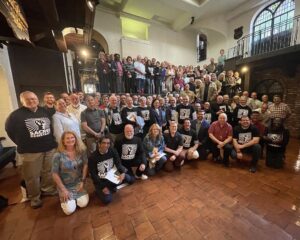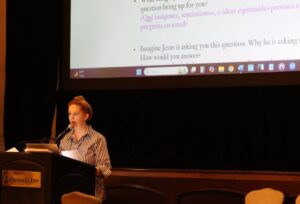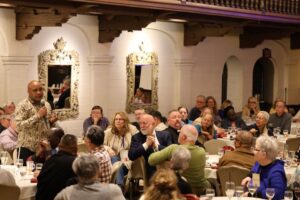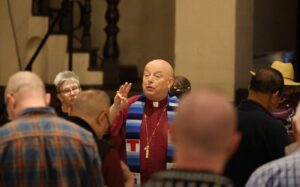 The Rev. Canon Whitney Rice, canon for evangelism and discipleship development in the Diocese of Missouri and keynote speaker at Clergy Conference 2025, led the clergy of the Los Angeles diocese through an exploration and discussion of the “questions of Jesus” in Riverside May 12-14. Rice is also the creator of the “Requiem or Renaissance” program, which is being adapted for use in Los Angeles.
The Rev. Canon Whitney Rice, canon for evangelism and discipleship development in the Diocese of Missouri and keynote speaker at Clergy Conference 2025, led the clergy of the Los Angeles diocese through an exploration and discussion of the “questions of Jesus” in Riverside May 12-14. Rice is also the creator of the “Requiem or Renaissance” program, which is being adapted for use in Los Angeles.In the course of four sessions, clergy read, reflected on, and discussed 28 questions asked by Jesus in the Bible. Clergy first read and reflected on the questions out of gospel context, then talked in small groups, before moving on to a full group discussion, and finally, as a group, putting the question in the full context of the bible passage and discussing how the meaning was changed.
 Rice’s method works outwards in the scope of the questions, from internal to communal, over the four sessions: Soul, Life, Call, and Gathering.
Rice’s method works outwards in the scope of the questions, from internal to communal, over the four sessions: Soul, Life, Call, and Gathering.Rice said that the questions Jesus asks in the Bible, 307 in total, especially in comparison to the only three he answers, show that Jesus leads with curiosity. In an introductory discussion, Bishop John Harvey Taylor had said that he used curiosity to guide his ministry, and Rice invited all clergy to join Taylor in leading from a place of curiosity.
Discussing questions like “Do you want to be made well?” (John 5:6), “Would you lay down your life for me?” (John 13:38), and “Why do you call me ‘Lord, Lord,’ and do not do what I tell you?” (Like 6:46), clergy shared that reflecting directly on Jesus’ questions was a powerful and vulnerable experience. Some were interested in sharing Rice’s method with their congregations.
 The final session of the program focused on community, under the theme “Gathering.” Ending with a discussion of the questions “Why do you not judge for yourselves what is right?” (Luke 12:57) “Did I not tell you that if you believed, you would see the glory of God?” (John 11:40), serving as the body of Christ, and leading others to community and to see the glory of God, sometimes when they’re not sure what it is they’re looking for. The night before, all the clergy gathered for a shared meal, sharing life changes and major events, applauding, celebrating, and mourning together.
The final session of the program focused on community, under the theme “Gathering.” Ending with a discussion of the questions “Why do you not judge for yourselves what is right?” (Luke 12:57) “Did I not tell you that if you believed, you would see the glory of God?” (John 11:40), serving as the body of Christ, and leading others to community and to see the glory of God, sometimes when they’re not sure what it is they’re looking for. The night before, all the clergy gathered for a shared meal, sharing life changes and major events, applauding, celebrating, and mourning together. In a final Eucharist service, Bishop Taylor’s sermon focused on Jesus’ question taken from John 20:15, “Why are you weeping?” Taylor spoke of funding cuts to HIV/AIDS programs in Africa, of inhumane conditions in border camps, where people who cannot safely return to their homes are unable to enter the U.S., of deportations, of forced starvation in Gaza. “How can we not?” Taylor asked in response to the question. And yet national tear ducts seem to be clogged, he said. He said that some preachers reportedly speak now of “the sin of empathy.”
In a final Eucharist service, Bishop Taylor’s sermon focused on Jesus’ question taken from John 20:15, “Why are you weeping?” Taylor spoke of funding cuts to HIV/AIDS programs in Africa, of inhumane conditions in border camps, where people who cannot safely return to their homes are unable to enter the U.S., of deportations, of forced starvation in Gaza. “How can we not?” Taylor asked in response to the question. And yet national tear ducts seem to be clogged, he said. He said that some preachers reportedly speak now of “the sin of empathy.”“Kindness did not win the popular vote,” Taylor said. “Kindness did not prevail in the electoral college. It’s unpopular. It’s unfashionable. Yes, this sounds like a job for the Episcopal Church. And indeed, for all people of true faith in our country today. You know what I mean by true faith: Jews, Christians, Muslims, anyone following a doctrine or a creed the centers the dignity of every human being, as all great things do. What if we find new friends in faith? What if we forge new partnerships, build new bridges, identify those values of love and human dignity that we all hold in common? There are tens of millions of us. And then we turn to our neighbor in the thrall of the politics of cruelty, and we say to our neighbor, why aren’t you weeping? How can you not weep?”
Taylor called on people of faith to bring love to politics and the national and global community. “Let’s imagine what may happen through God’s glory, and God’s people, if we lay aside differences in denomination and doctrine, and form new coalitions and communities of worship and fellowship and action dedicated to God’s love and justice, and resolve to do nothing more than douse our nation with our tears, teach our nation to weep again,” Taylor said.
